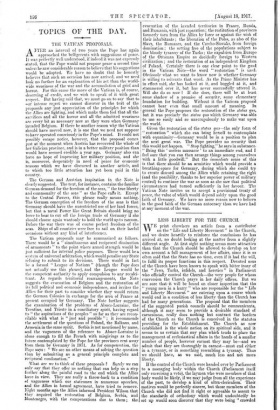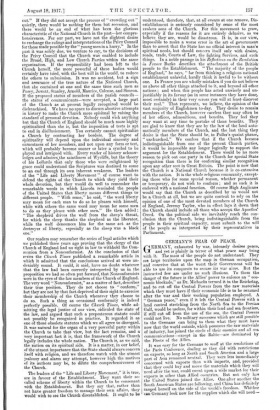LESS LIBERTY FOR THE CHURCH.
WE print elsewhere an article from a contributor on the "Life and Liberty Movement" in the Church, and we desire heartily to reinforce the conclusions he has arrived at, no doubt looking at the matter from a slightly different angle. At first sight nothing seems more attractive than that the Church should be allowed to develop on her own account a full management of her affairs, since it is so often said that the State has no time, even if it had the will, to fulfil its proper functions in this respect. Devoted sons of the Church have been known to speak with bitter irony of the " Jews, Turks, infidels, and heretics " in Parliament who officially control the Church—the very people for whose conversion the Church prays in her daily offices. But we are sure that•it will be found on closer inspection that the " young men in a hurry " who are responsible for the " Life and Liberty Movement " are entering upon a course which would end in a condition of less liberty than the Church has had for many generations. The proposal that the members of the suggested parish councils should be communicants, although it may seem to provide a desirable standard of earnestness, really does nothing but contract the borders of the Church as the Church is conceived in the statutes providing for the Establishment. The Church as now established is the whole nation on its spiritual side, and it seems to us certain that any plan which tends to place the management of ecclesiastical affairs in the hands of a smaller number of people, however earnest they may be—and we admit that they are thoroughly in earnest—must end either in a tyranny, or in something resembling a tyranny. Thus we should have, as we said, much less and not more liberty.
If the control of the Church were handed over by Parliament to a managing body within the Church (Parliament itself only exercising a veto), the laymen who were members of that body would be likely, if we may judge from all the experience of the past, to develop a kind of ultra-clericalism. Their motives would be perfectly sincere, but those members of the Church -who did not find it right or agreeable to assent to the standards of orthodoxy which would undoubtedly be set up would soon discover that they were :being " crowded
out." If they did not accept the process of " crowding out " quietly, there would be nothing for them but secession, and there would be an. end of what has been the glorious characteristic of the National Church in the past—her compre- hensiveness. For onr part, we have not the slightest desire to exchange the rulings and interpretations of the Privy Council for those made possible by the " young men in a hurry." In the past it was solely due, we venture to say, to the decisions of the Privy Council that the Church was enabled to include the Broad, High, and Low Church Parties within the same organization. If the responsibility had been left to the Church herself, the more powerful of these bodies would certainly have tried, with the best will in the world, to reduce the others to submission. It was no accident, but a sign and assurance of the true nature of the National Church, that she contained at one and the same time such men as Pusey, Jewett, Stanley, Arnold, Maurice, Colenso, and Simeon. If the proposed status of members of the parish councils— the status of communicants—were accepted, a large part of the Church as at present legally recognized would be disfranchised. We have no space to discuss abortive attempts in history to make the Church more spiritual by raising the standard of personal devotion. Nobody could wish anything but that the Church of England should be much more highly spiritualized than she is, but the imposition of tests is apt to end in disillusionment. You certainly cannot spiritualize a Church by contracting her borders. The degree of spirituality will depend upon the individual sincerity and earnestness of her members, and not upon any form or test, which will probably become sooner or later a symbol to be played and intrigued with. Every reader of history acknow- ledges and admiresIthe saintliness of Wycliffe, but the theory of his Lollards that only those who were enlightened by grace could understand the Scriptures was destined to come to an end through its own inherent weakness. The leaders of the " Life and Liberty Movement " of course want to defend the rights of. the Church to which they yield their whole devotion, but they would do well to remember the remarkable words in which Lincoln reminded the people of the United States that liberty means different things to different people. " With some," he said, " the word liberty may mean for each man to do as he pleases with himself, while with others the same word may mean for some men to do as they please with other men." He then added : " The shepherd drives the wolf from the sheep's throat, for which the sheep thanks the shepherd as the liberator, while the wolf denounces him for the same act as the destroyer of liberty, especially as the sheep was a black one."
Our readers may remember the series of legal articles which we published three years ago proving that the clergy of the Church of England had no right in law to withhold the Com- munion from a Nonconformist. At the conclusion of that series the Church Times published a remarkable article in which it admitted that the' conclusions arrived at were un- deniably sound. It could, it said, have no doubt whatever that the law had been correctly interpreted by us in the proposition we had so often put forward, that Nonconformists were in the eyes of the law members of the Church of England. The very word " Nonconformist," as a matter of fact, describes their true position. They do not choose to " conform," but they are not by that fact deprived of their right to exercise their membership of the Church whenever they choose to do so. Such a thing as occasional conformity is indeed perfectly possible. Of course the Church Times, while ad- mitting the legal justice of our view, ridiculed the state of the law, and argued that such a preposterous statute could not possibly be recognized in practice. It regarded it as one of those obsolete statutes which we all agree to disregard. It was natural for the organ of a very powerful party within the Church to take that view, but the fact remains, and a very important fact it is, that the framework of the Church legally includes the whole nation. The Church is, as we said, the nation on its spiritual side. It is a matter, in our belief, of the utmost importance that the State should always concern itself with religion, and we therefore watch with the utmost jealousy and alarm any attempt, however high the motives of its authors may be, to dilute the comprehensiveness of the Church.
The leaders of the "Life and Liberty Movement," it is true, are in favour of the Establishment. They want their so- called scheme of liberty within the Church to be consonant with the Establishment. But they say that, rather than not have greater freedom to manage their own affairs, they would' wish to see the Church disestablished. It ought to be
understood, therefore, that, at all events at one remove, Ms- establishment is seriously considered by some of the most zealous sons of the Church. For this movement to grow, especially if the reasons for it are entirely delusive, as we believe they are, would be disastrous. It is, in our view, impossible to make a worse error in the art of government than to assert that the State has no official interest in man's spiritual needs, but should concern itself only with drains, roads, trade, Courts of Law, the fighting Services, and such things. In a noble passage in his Reflections on the Revelation in France Burke describes the attachment of the British' people to the Establishment. " The majority of the people of England," ho says, " far from thinking a religious national establishment unlawful, hardly think it lawful to be without one. In France you arc wholly mistaken if you do not believe us above all other things attached to it, and beyond all other nations ; and when this people has acted unwisely and un- justifiably in its favour (as in some instances they have done„ most certainly) in their very errors you will at least discover their zeal." That represents, we believe, the opinion of the vast majority of Englishmen to-day. They desire to remain members of the Church, however careless they may often be of her offices, admonitions, and benefits. They feel they may want at any time to partake of those benefits. They are glad to know that they are by the law of the land auto- matically members of the Church, and the last thing they desire is that the State should be, in Fuller's quaint phrase, " unchurched." We confess that if the Church became indistinguishable from one of the present Church parties, it would be impossible any longer logically to support the argument for the Establishment. There would be no more reason to pick out one party in the Church for special State recognition than there is for conferring similar recognition upon any other sect in Great Britain. The point is now that the Church is a National Church because it is co-extensive with the nation. It is the whole religious community, except- ing those who for some special reason, whether permanent or temporary, do not wish to conform ; and as such it is endowed with a national function. Of course High Anglicans would say that the Church as described by us would not be a Church at all, but we are quite content to rely on the opinion of one of the most devoted members of the Church of England, Jeremy Taylor, who in effect lays it down that the Church should include all those who accept the Apostles* Creed. On the political side we inevitably reach the con- clusion that the Church, being indistinguishable from the people in their spiritual capacity, must submit to the will of the people as interpreted by their representatives in Parliament.



























 Previous page
Previous page